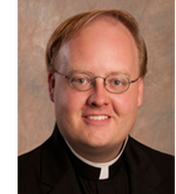|
During the month of December, the Church once again turns her attention to the Blessed Virgin Mary and, in particular, her Immaculate Conception. The Catechism of the Catholic Church states:
To become the mother of the Savior, Mary “was enriched by God with gifts appropriate to such a role.” The angel Gabriel at the moment of the annunciation salutes her as “full of grace.” In fact, in order for Mary to be able to give the free assent of her faith to the announcement of her vocation, it was necessary that she be wholly borne by God’s grace. Through the centuries the Church has become ever more aware that Mary, “full of grace” through God, was redeemed from the moment of her conception. That is what the dogma of the Immaculate Conception confesses, as Pope Pius IX proclaimed in 1854: The most Blessed Virgin Mary was, from the first moment of her conception, by a singular grace and privilege of almighty God and by virtue of the merits of Jesus Christ, Savior of the human race, preserved immune from all stain of original sin. The “splendor of an entirely unique holiness” by which Mary is “enriched from the first instant of her conception” comes wholly from Christ: she is “redeemed, in a more exalted fashion, by reason of the merits of her Son.” The Father blessed Mary more than any other created person “in Christ with every spiritual blessing in the heavenly places” and chose her “in Christ before the foundation of the world, to be holy and “blameless before him in love.” The Fathers of the Eastern tradition call the Mother of God “the All-Holy” (Panagia), and celebrate her as “free from any stain of sin, as though fashioned by the Holy Spirit and formed as a new creature.” By the grace of God Mary remained free of every personal sin her whole life long. (CCC #490-493) This understanding of the Church points out a few important points. The first is that Mary was prepared for her role as the Mother of the Savior in a particular way. We know that God not only calls people to certain tasks, but also calls them and then supplies those things necessary for the completion of that task. In the case of the Blessed Mother, she is given a place in salvation history like none other – to be the Mother of God. In His mercy, then, God prepares her for such a role by preserving her from the sin of Adam and Eve, original sin, so that she may be the Immaculate Mother of God, free of all sin and the defilement which comes from sin. This preservation from original and actual sin takes place at the very moment of her conception – hence, the title “the Immaculate Conception.” Secondly, the definition of the Catechism points out, in the words of Pope Pius IX, that this is “a singular grace and privilege” and flows from the merits of Christ Himself, in other words, Our Lady’s Immaculate Conception and the specific prevenient grace that is involved is a grace which flows from Christ and His own merits. Finally, we see that “the Father blessed Mary more than any other created person…” There is no one like the Blessed Mother and no one who ever will be like her – she is unique and exalted above all other creatures. The Collect of the Mass for the Immaculate Conception beautifully sums up both the dogma of the Immaculate Conception as well as how such a dogma applies to us: O God, who by the Immaculate Conception of the Blessed Virgin prepared a worthy dwelling for your Son, grant, we pray, that, as you preserved her from every stain by virtue of the Death of you Son, which you foresaw, so, through her intercession, we, too, may be cleansed and admitted to your presence. Through our Lord Jesus Christ, your Son, who lives and reigns with you in the unity of the Holy Spirit, one God, forever and ever. Amen. For reading, perhaps the best place to start is with the Apostolic Constitution in which Blessed Pope Pius IX infallibly defines the dogma of the Immaculate Conception, Ineffabilis Deus. As has been mentioned before, the book “The Glories of Mary” by St. Alphonsus Liguori can be a helpful book with much to consider. You may also want to consider “The Song of Bernadette” which relays the story of St. Bernadette of Lourdes, to whom the Blessed Mother appears and says that she is the Immaculate Conception. (This article is part of a series that will appear over the course of this year on the Monthly Devotions of the Church’s year). Comments are closed.
|
Fr. PeterArchives
June 2023
Categories |
Join us at MassSaturday at 4pm;
Sunday at 7:30am, 9:00am, 10:30am Daily Masses: Monday-Friday 6:30am Tuesday/Friday 8::00am (school days only) Saturdays 8:00am Sacrament of Reconciliation |
|


 RSS Feed
RSS Feed
